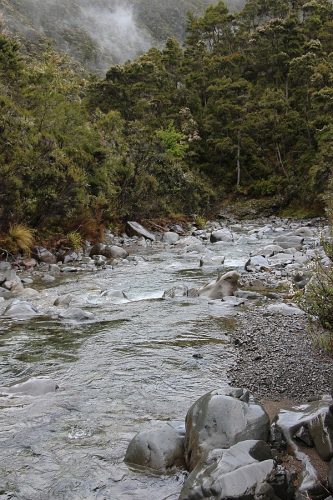In July 2022, Bangladesh became the first country to grant all of its rivers the same legal status as humans.
The movement to grant legal status to nature began in 2008 when Ecuador became the first country to do so. Subsequently, Bolivia passed a similar law in 2011. In 2017 New Zealand became the first country to grant a specific river legal rights. In 2019 the city of Toledo, Ohio passed what is known as the Lake Erie Bill of Rights to protect its shores. Several communities in the United States have passed similar legislation recognizing the rights of nature.[1]

(Ngaruroro River. Taken from the track between Kiwi Mouth and Kiwi Saddle Hut. Kawekas, New Zealand
Date 3 January 2016, 08:05:30
Source Own work
Author Michal Klajban)
wikipedia.org
These countries subscribe to the idea of environmental personhood. This is defined as “the nascent notion of designating parts of nature as legal persons entitled to independent regard and consideration.” [2]
As believers in God the Creator of all things, we are obligated to act as faithful stewards of our environment. Of that, there is no question. However, something is terribly amiss, I daresay schizophrenic, when personhood is granted to nature but not to the fetus.
In Bangladesh, abortion is technically restricted, but women can terminate their pregnancies within 10 weeks of their last menstrual period by a procedure known as menstrual regulation. Ecuador allows abortion in cases of rape. New Zealand allows abortion up to the date of birth. In Canada abortion is unrestricted. Up until the recent Supreme Court ruling in the Mississippi v. Dobbs, and the fall of Roe v. Wade, abortion was unrestricted in the United States before 24 weeks (i.e,. ‘viability’), with various states differing on how they regulated and restricted abortion after that time. It is still widely available until the various states formulate new legislation.
It’s a dismal commentary on the human race that one can get into more trouble cutting down a tree than having or performing an abortion.
[1] Constructing the Rights of Nature: Constitutional Reform, Mobilization, and Environmental Protection in Ecuador. Maria Akchurin. 27 December 2018, https://doi.org/10.1111/lsi.12141, (accessed 27 August 2022).
[2] Environmental Personhood. Gwendolyn Gordon. 7 March 2017, http://dx.doi.org/10.2139/ssrn.2935007, (accessed 27 August 2022).












